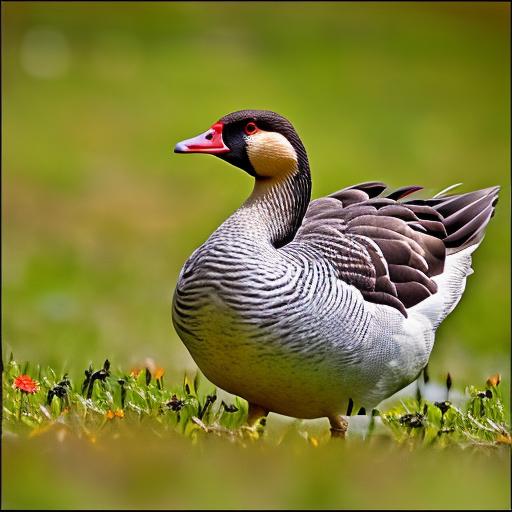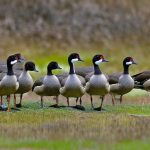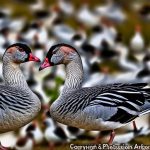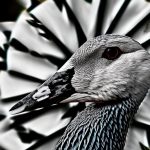Geese are highly social birds that are known for their strong family bonds and flocking behavior. They are often found in large groups, and they tend to stick together for safety and protection. Geese are also known for their territorial nature, especially during the breeding season. They can become aggressive and defensive when they feel their nesting sites or young are threatened. Geese are also attracted to open spaces near water, such as ponds, lakes, and rivers, where they can find food and nesting sites. They are herbivores and feed on grass, aquatic plants, and grains, making them particularly attracted to well-maintained lawns and agricultural fields.
Geese are also known for their honking calls, which they use to communicate with each other and to warn of potential threats. They have keen eyesight and can quickly detect movement and changes in their environment. Geese are also known for their strong homing instincts, which means they will return to the same nesting and feeding sites year after year. Understanding the behavior of geese is crucial when it comes to implementing effective deterrent strategies to keep them away from your property.
Geese are highly adaptable birds that can thrive in a variety of environments, from urban parks to rural farmlands. They are also known for their intelligence and ability to learn and adapt to new situations. This means that traditional deterrent methods may not always be effective in the long term, as geese can quickly become accustomed to them. It’s important to take into account the behavior and habits of geese when developing a comprehensive plan for geese control on your property.
Key Takeaways
- Geese are social birds that exhibit territorial behavior and can become aggressive when they feel threatened.
- Natural deterrents such as planting certain types of grasses and shrubs can discourage geese from entering your property.
- Physical barriers like fences, hedges, and netting can effectively prevent geese from accessing your property.
- Sound and visual deterrents such as predator decoys, reflective tape, and sonic devices can be used to repel geese.
- Landscaping strategies like creating steep banks, installing water features, and using motion-activated sprinklers can make your property less attractive to geese.
- Professional services such as habitat modification and population control can be employed to manage geese on your property.
- Legal considerations such as obtaining permits and following regulations should be taken into account when dealing with geese on your property.
Natural deterrents to keep geese away
There are several natural deterrents that can be used to keep geese away from your property. One effective method is to use plants that are unappealing to geese, such as tall grasses and shrubs with thorns or prickly leaves. These plants can create barriers that make it difficult for geese to access open areas where they like to feed and nest. Additionally, planting dense vegetation along the shoreline of ponds or lakes can discourage geese from congregating in those areas.
Another natural deterrent is the use of natural predators, such as dogs or birds of prey, to scare off geese. The presence of these predators can create a sense of danger for geese, causing them to seek out safer areas away from your property. However, it’s important to note that using predators as a deterrent may not be suitable for all environments, especially in urban or residential areas.
Finally, creating natural barriers such as floating islands or rafts in bodies of water can discourage geese from congregating in those areas. These barriers can disrupt the natural habitat of geese and make it less appealing for them to gather in large numbers. By using natural deterrents, you can effectively discourage geese from settling on your property without causing harm to the birds or the environment.
Physical barriers to prevent geese from entering your property
Physical barriers can be an effective way to prevent geese from entering your property and causing damage. One common physical barrier is the use of fencing or netting to enclose areas where geese are not welcome. Fences can be constructed around ponds, lawns, and gardens to create a physical barrier that prevents geese from accessing these areas. Additionally, netting can be used to cover crops or vegetation that may be attractive to geese, such as berry bushes or vegetable gardens.
Another physical barrier that can be used is the installation of floating barriers on bodies of water. These barriers can be made from materials such as plastic or metal and can be placed strategically to prevent geese from accessing certain areas. Floating barriers can disrupt the natural habitat of geese and make it less appealing for them to congregate in those areas.
In some cases, physical barriers such as hazing devices or visual deterrents can also be used to prevent geese from landing on certain surfaces. These devices can create a sense of unease for geese and make it uncomfortable for them to settle in those areas. By implementing physical barriers, you can effectively prevent geese from entering your property and causing damage to your landscape or crops.
Using sound and visual deterrents to repel geese
Sound and visual deterrents can be effective tools for repelling geese from your property. One common sound deterrent is the use of propane cannons or other noise-making devices that emit loud sounds at regular intervals. These devices create a sense of danger for geese and can discourage them from settling in certain areas. However, it’s important to use sound deterrents responsibly and considerate of nearby residents or wildlife.
Visual deterrents such as scarecrows, reflective tape, or predator decoys can also be used to repel geese from your property. These visual deterrents create a sense of danger for geese and make it uncomfortable for them to settle in those areas. Additionally, using laser or strobe lights can create visual disturbances that make it less appealing for geese to congregate in certain locations.
Another effective visual deterrent is the use of motion-activated devices that emit bursts of water or air when geese approach. These devices startle geese and create a sense of danger, causing them to seek out safer areas away from your property. By using sound and visual deterrents responsibly, you can effectively repel geese from your property without causing harm to the birds or the environment.
Implementing landscaping strategies to discourage geese
Landscaping strategies can be used to discourage geese from settling on your property by making it less appealing for them to congregate in certain areas. One effective strategy is to create natural barriers using dense vegetation such as tall grasses, shrubs with thorns, or prickly leaves. These plants can create physical barriers that make it difficult for geese to access open areas where they like to feed and nest.
Additionally, creating sloped shorelines around bodies of water can discourage geese from congregating in those areas. Geese prefer flat shorelines where they can easily access water and feed on vegetation, so creating sloped shorelines can make it less appealing for them to settle in those locations. Planting native vegetation along shorelines can also provide natural habitat for other wildlife while discouraging geese from congregating in those areas.
Another landscaping strategy is the use of gravel or rocks along shorelines or open areas where geese tend to congregate. Geese prefer soft surfaces where they can easily access food and water, so using gravel or rocks can make it uncomfortable for them to settle in those locations. By implementing landscaping strategies that make it less appealing for geese to congregate on your property, you can effectively discourage them from settling in those areas.
Professional services for geese control
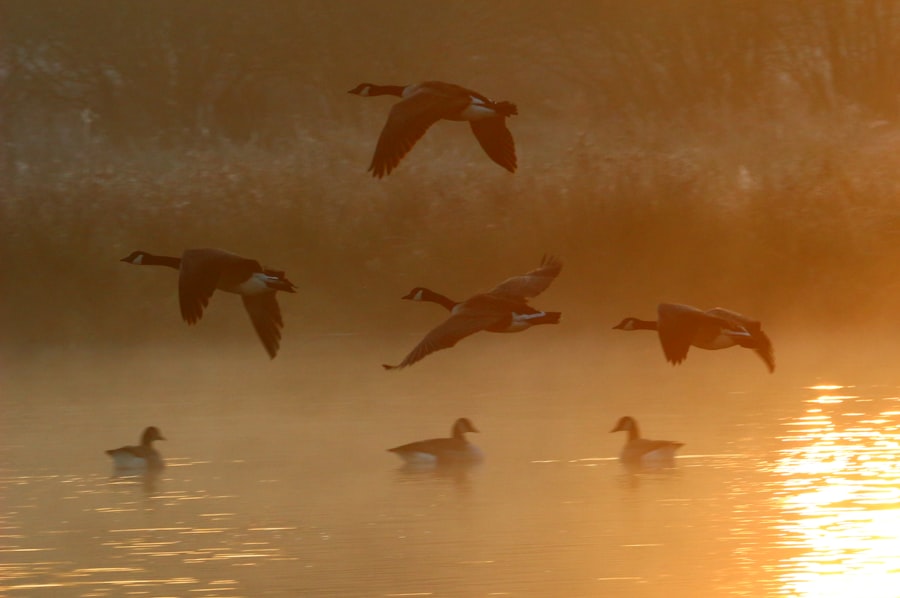
In some cases, professional services may be necessary to effectively control geese on your property. There are companies that specialize in humane geese control methods and can provide comprehensive solutions tailored to your specific needs. These professionals have the knowledge and experience to implement effective deterrent strategies while ensuring the safety of the birds and the environment.
One common professional service for geese control is the use of trained dogs to patrol areas where geese tend to congregate. These dogs are trained to chase away geese without causing harm to the birds or the environment. Additionally, professional services may include the installation of physical barriers such as fencing, netting, or floating islands to prevent geese from accessing certain areas.
Another professional service for geese control is the use of habitat modification techniques that make it less appealing for geese to settle on your property. This may include the installation of vegetation management programs, water quality management, or shoreline restoration projects that create natural barriers and disrupt the habitat of geese.
Professional services may also include ongoing monitoring and maintenance to ensure that deterrent strategies remain effective over time. By enlisting the help of professional services for geese control, you can effectively address the issue of geese on your property while ensuring the safety of the birds and the environment.
Legal considerations when dealing with geese on your property
When implementing deterrent strategies for geese control on your property, it’s important to consider any legal regulations or restrictions that may apply. In many regions, geese are protected under wildlife conservation laws, which means that certain deterrent methods may be prohibited or require special permits.
Before implementing any deterrent strategies, it’s important to research local regulations and consult with wildlife authorities or conservation organizations to ensure compliance with legal requirements. This may include obtaining permits for certain deterrent methods or implementing alternative strategies that are approved under wildlife conservation laws.
Additionally, it’s important to consider the potential impact of deterrent methods on other wildlife species and the environment. Some deterrent methods may have unintended consequences for non-target species or disrupt the natural balance of ecosystems. It’s important to consider these factors when developing a comprehensive plan for geese control on your property.
By taking into account legal considerations when dealing with geese on your property, you can ensure that deterrent strategies are implemented responsibly and in compliance with wildlife conservation laws. This will help protect both the birds and the environment while effectively addressing the issue of geese on your property.
In conclusion, understanding the behavior of geese is crucial when developing a comprehensive plan for geese control on your property. By using natural deterrents, physical barriers, sound and visual deterrents, landscaping strategies, professional services, and considering legal regulations, you can effectively address the issue of geese on your property while ensuring the safety of the birds and the environment. With careful planning and responsible implementation, you can create a harmonious coexistence with wildlife while protecting your property from damage caused by geese.
Looking to keep geese away from your property? Check out this helpful article on PoultryWizard.com that provides tips and strategies for managing geese on your property. Whether you’re dealing with geese in your backyard, garden, or near your pond, this article offers practical advice to help you deter these birds effectively. For more information on keeping geese at bay, visit PoultryWizard.com.
FAQs
What are some effective methods to keep geese away from your property?
Some effective methods to keep geese away from your property include using visual deterrents such as scarecrows or reflective tape, using sound deterrents such as noise-making devices, installing physical barriers like fences or netting, and using natural repellents such as predator decoys or landscaping with plants that geese dislike.
Are there any non-lethal methods to keep geese away from your property?
Yes, there are several non-lethal methods to keep geese away from your property. These include using visual and sound deterrents, installing physical barriers, and using natural repellents. It is important to note that geese are protected under the Migratory Bird Treaty Act, so it is illegal to harm or kill them without a permit.
What are some natural repellents that can be used to keep geese away?
Some natural repellents that can be used to keep geese away include predator decoys such as fake coyotes or dogs, as well as landscaping with plants that geese dislike, such as tall grasses or shrubs with thorns.
Are there any legal restrictions on how to keep geese away from your property?
Yes, there are legal restrictions on how to keep geese away from your property. Geese are protected under the Migratory Bird Treaty Act, so it is illegal to harm or kill them without a permit. It is important to use non-lethal methods and to check with local authorities for any additional regulations or restrictions.
What are some potential drawbacks of using certain methods to keep geese away from your property?
Some potential drawbacks of using certain methods to keep geese away from your property include the need for ongoing maintenance and upkeep of deterrents, the potential for habituation where geese become accustomed to the deterrents, and the possibility of unintended consequences on other wildlife or the environment. It is important to carefully consider the potential drawbacks of each method before implementing it.
Meet Walter, the feathered-friend fanatic of Florida! Nestled in the sunshine state, Walter struts through life with his feathered companions, clucking his way to happiness. With a coop that’s fancier than a five-star hotel, he’s the Don Juan of the chicken world. When he’s not teaching his hens to do the cha-cha, you’ll find him in a heated debate with his prized rooster, Sir Clucks-a-Lot. Walter’s poultry passion is no yolk; he’s the sunny-side-up guy you never knew you needed in your flock of friends!

